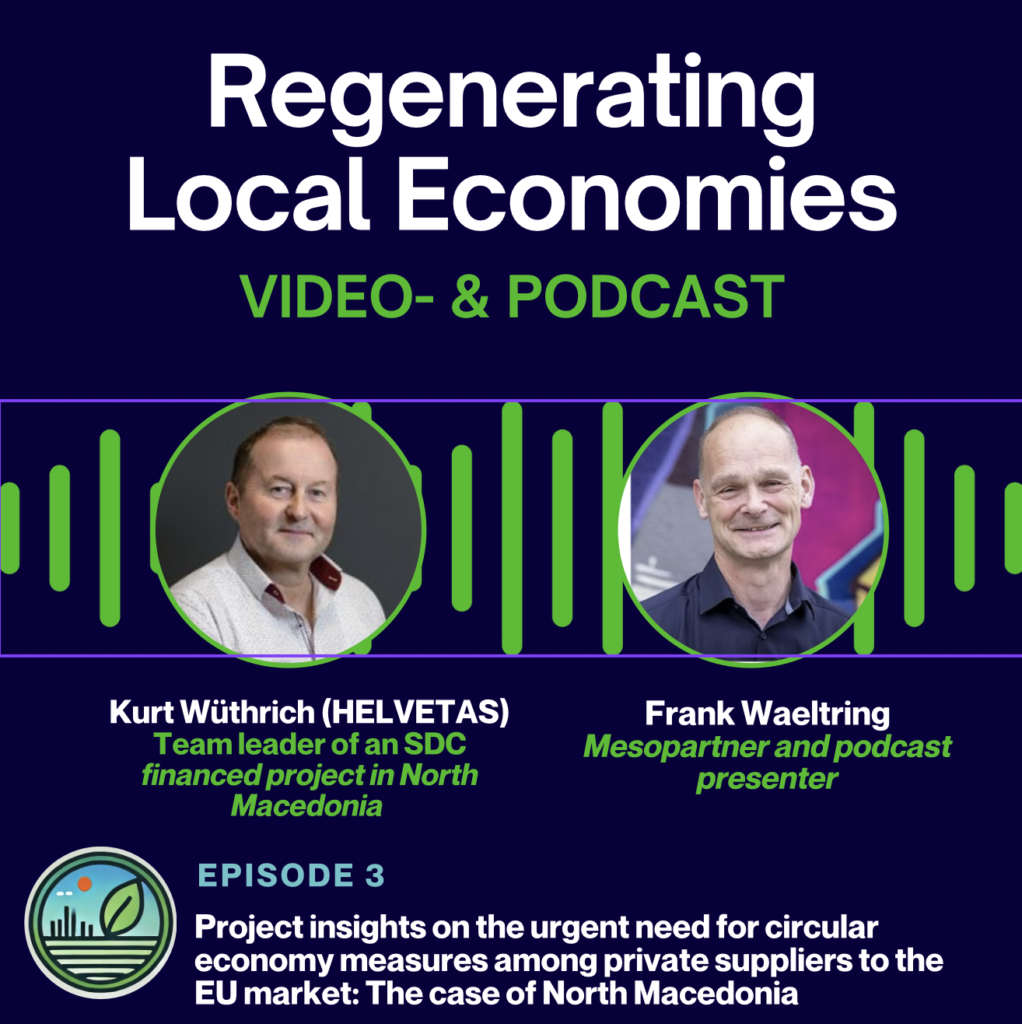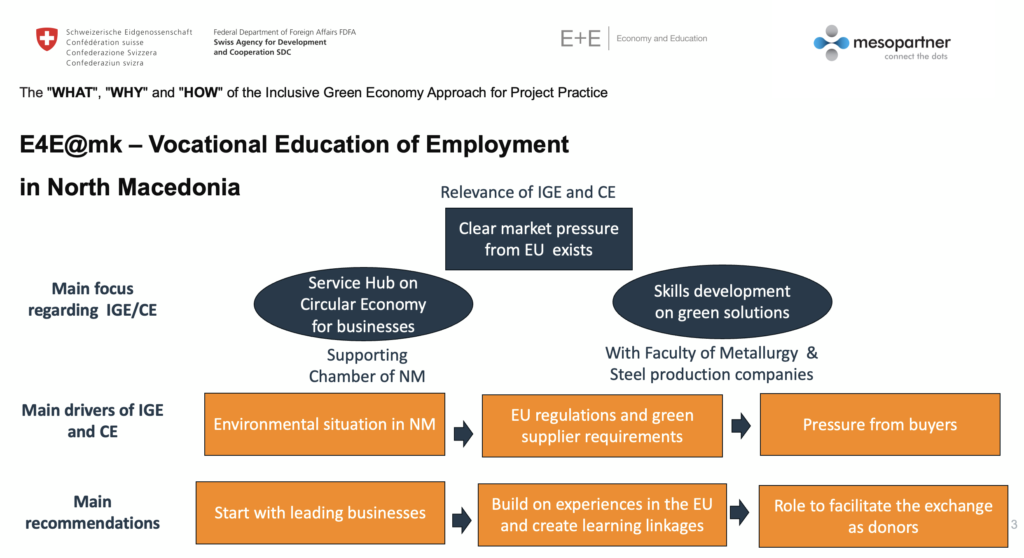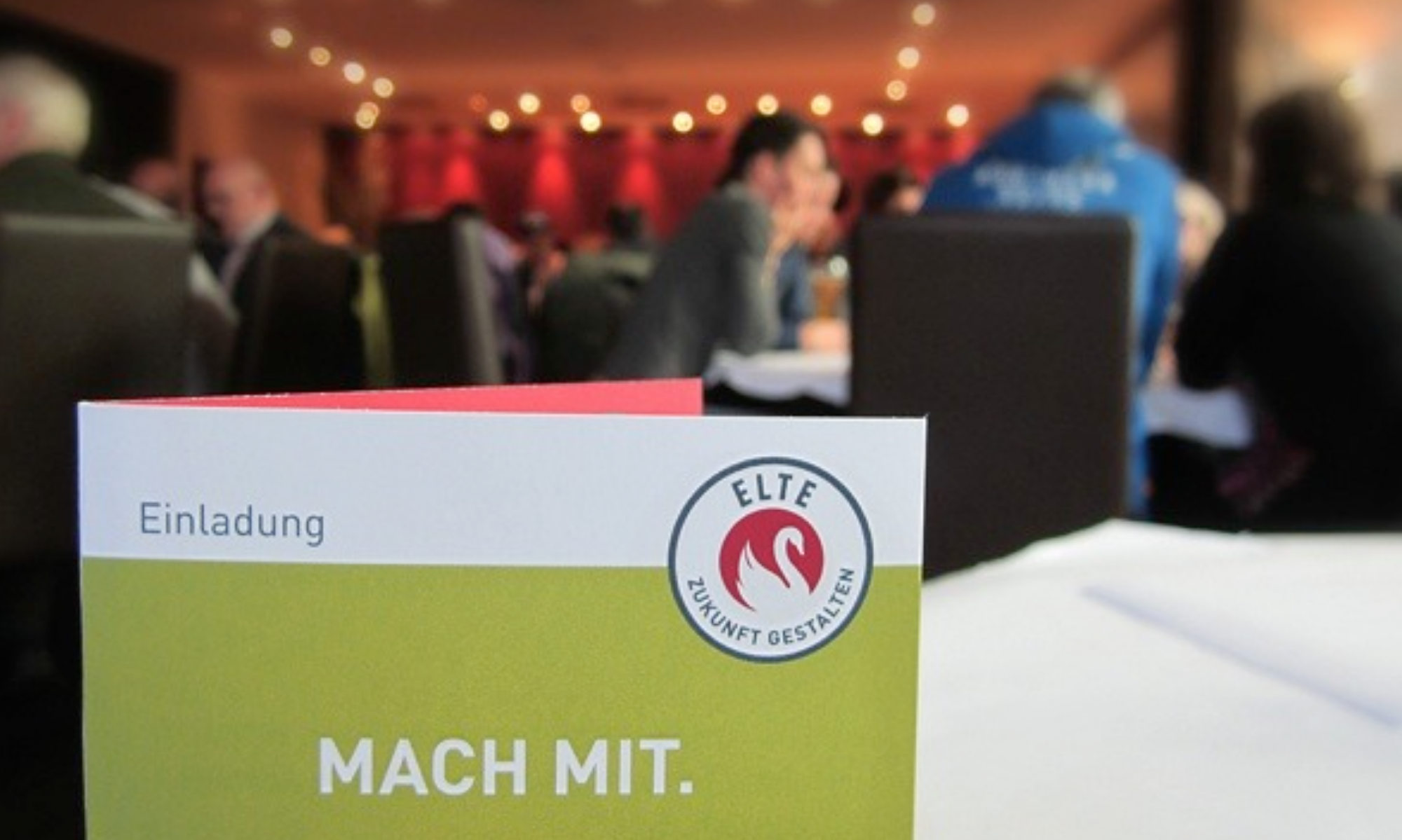Frank Wältring (Mesopartner) in conversation with Kurt Wüthrich (Helvetas), Team Leader of the Program „Education for Employment in North Macedonia (E4E@mk)“ on the relevance and urgency of the circular economy topic from a business demand-oriented perspective.
This written interview is a summarised version of the available videocast and podcast:

Frank:
Thanks Kurt for your availability. We want to reflect on your experience with the Inclusive Green Economy approach—especially your integration of circular economy principles into your project. You’re based in North Macedonia and you’re the team leader of a project with Helvetas. Could you start by giving us a brief overview of the main focus of the project?
Kurt:
Thank you, Frank. Yes, we’re currently implementing a vocational skills development project for SDC. The project mainly focuses on two areas: First, we support long-term improvements in the formal education system. Second, we work on short-term solutions to meet the immediate needs of the private sector.
Frank:Why is the circular economy relevant to your project? What’s the context you’re operating in North Macedonia?
Kurt:
The circular economy is still a relatively new concept here—for both our project and the country. But I would say three main factors are driving the topic forward:
First, the environmental situation: Pollution, waste management, and the overuse of natural resources are serious challenges. Second, the structure of the economy: We’re a small economy, but we have a number of medium and large companies that mainly export to the European Union. Third, there is EU regulatory pressure: These exporting companies face increasing demands to comply with EU regulations, especially regarding ESG (Environmental, Social, and Governance) standards.
This pressure is manageable for larger or foreign-invested companies, but it creates significant challenges for their suppliers—who are also part of the value chain. So, yes, much of the momentum comes from external economic pressures.
Frank:
We see this pressure in many other countries closely located close to the EU, like the Western Balkan countries and the Eastern Partnership countries. In a study and a summary video presentation on „EU Green Deal Trends for SMEs and the Impact on Value Chains in South East Europe“ we focused on the wood-processing and metal sector in Bosnia and Herzegovina where leading SME supplier companies expressed the incressing pressure they are experiencing from EU buyers but also from EU Directives and the Carbon Border Adjustment Mechanism (CBAM) regulation. To what extent are you supporting SMEs in North Macedonia to better cope with green certification or circular economy pressure from outside?
Figure 1: Summary of the E4E project reflections (designed by Mesopartner based on the conversation)

Kurt:
We’re currently working on two initiatives. First, we’re collaborating with the Economic Chamber of North Macedonia, which has recently established a Circular Economy Hub—as a response to the growing demand from the private sector. Our aim is to facilitate innovation by enabling companies to bring forward specific challenges, which can then be addressed in cooperation with experts—from local universities, national specialists, or international experts if needed.
We plan to co-finance the expertise required in the initial phase, while the participating companies would cover part of the costs themselves. The second initiative involves a partnership between the Faculty of Metallurgy and a large steel-producing company here in North Macedonia. This company has committed fully to circular economy principles, using only recycled steel sourced from the region. The collaboration aims to build capacity across different levels of the company—helping employees better understand and implement circular processes in this highly specific industrial context.
Frank:
So you’re building industry-specific skills while also strengthening cooperation between the university and the private sector. That sounds very close to what we often hope for in dual training systems. And the university is also being prepared to respond to the private sector’s knowledge demands on circular economy topics?
Kurt:
Exactly. The steel industry, in particular, has specialised equipment that universities don’t have. So close cooperation is essential. The company has even opened its doors to other businesses for training purposes. Meanwhile, the faculty manages the teaching side. It’s a strong example of public-private collaboration.
Frank:
What I find especially interesting is that your approach is so demand-driven—you’re reacting directly to the needs of the private sector while also strengthening research and applied knowledge capacities. Based on your experience, what would be two or three core recommendations for others who want to move from abstract circular economy discussions to practical, private-sector-driven implementation?
Kurt:
First, engage the private sector as the key driver. Work with bigger „champion“ companies that already have the motivation and capacity to lead. These companies often serve as models for others, and they can push policy development, standards, and guidelines.
Second, don’t reinvent the wheel. There’s a wealth of experience—especially in the EU—that we can learn from. Many companies in North Macedonia already work with EU partners or export to the EU, so the know-how is accessible. Third, as donors or facilitators, we can help build those bridges and enable knowledge transfer.
Frank:
So your focus is on private sector integration, tapping into EU learning opportunities, and strengthening local capacity, particularly through associations and academic institutions. But let’s say someone told you that circular economy is just a buzzword, not something donors should focus on when promoting skills and private sector development. What would you say?
Kurt:
I’d go back to my first point. North Macedonia is an export-driven economy. No one is waiting for us. We have to move quickly—there’s simply no alternative. Too often, the circular economy is still seen as a burden when, in fact, it’s a real opportunity. Especially for medium and larger companies—and eventually also for SMEs—it’s essential to act now and adapt.
Frank:
Thank you, Kurt. I think you’ve made a compelling case for the relevance and urgency of this topic—especially from a demand-driven and context-sensitive perspective.
Kurt:
Thank you, Frank. I’m always happy to share more or answer any additional questions.
If you want to contact Kurt Wüthrich for further insights, you can approach him via his mail adress: Kurt.Wuethrich@helvetas.org
